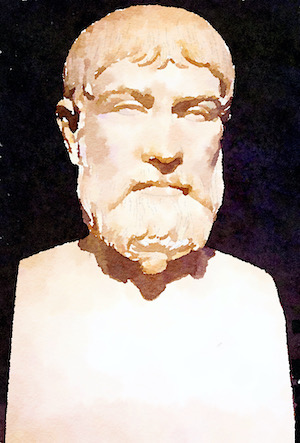
Ancient Greece's greatest lyric poet Pindar (in Greek Pindaros, c.522-c.440 BCE) was born into an illustrious family near Thebes in Boeotia and reputedly died in Argos.
While details of his early life are sketchy, he is reputed to have learnt composition from the Boeotian poet Corinna and received his musical education in Athens.
He began his career with an ode commissioned honour of a winner in one of the national games in 498 BCE. While he was famous for his poems celebrating the victors at the Olympian, Pythian, Isthmian, and Nemean games, he produced a vast body of work, including all forms of choral lyric.
His fame was such that—a century years after his death—Alexander the Great ordered his troops to spare the poet's house when they sacked and razed Thebes and enslaved its citizens. The ruins of the house were still visible when Pausanias visited Thebes around 150 CE.
Scholars working in the Library of Alexandria subsequently arranged his output into seventeen books according to their types. Of these, only the four books celebrating the victors of athletic contests and containing forty-four poems survive. According to legend, they, too, could have been lost. Their survival is supposedly due to their use in a 2nd-century textbook.
These Epinician Odes work from a religious standpoint. By themselves, men are nothing; success is god-given to those who strive for it if their breeding makes them worthy. Pindar does not recount the contests in detail, preferring to link each victory to a glorious past through references to mythical gods, heroes, and abstract powers.
The rest of his work is known chiefly from quotations and citations.
Sources:
Chambers Biographical Dictionary
Encyclopedia Britannica
Oxford Companion to Classical Literature
Oxford Companion to English Literature
Philips World Encyclopedi